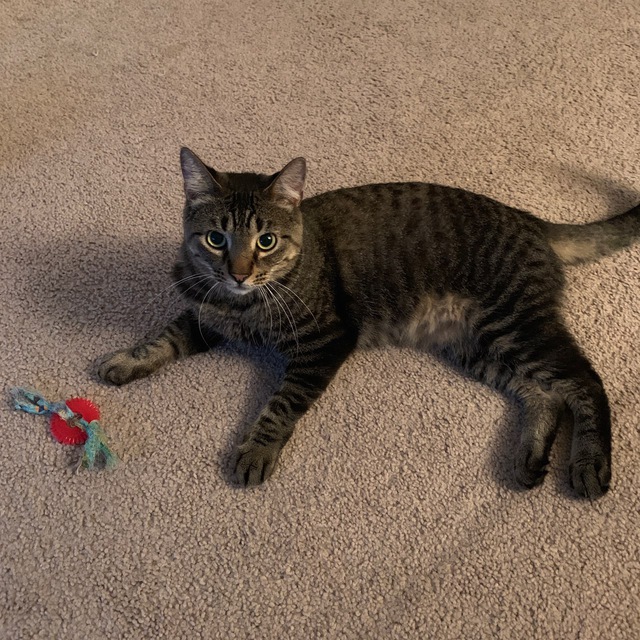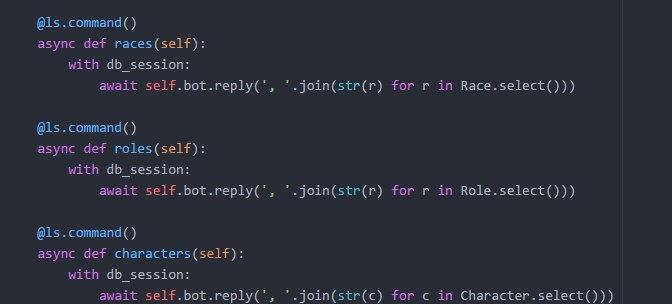Not yet. In short, we will replace
db.bind(**settings.db_params)
db.generate_mapping(create_tables=True)
to
db.connect(**settings.db_params)
and allow a developer to define the following script migrate.py in his project folder:
import settings
from models import db
db.migrate(**settings.db_params)
Then a developer can run
python migrate.py make
to generate new migration file,
python migrate.py apply
to actually perform migration
or python migrate.py sql
to show sql of the migration
It is also possible to call python migrate.py make --custom to create a file of migration in which it is possible add arbitrary UPDATE or ALTER TABLE command manually.
The details of API will be revealed soon
How will versioning of the API work?
Add
`db = orm.Database(version=3)`
In one file, and
`db = orm.Database(version=4)`
In the next?
So it can detect the current state and upgrade accordingly?
 Alexander
Alexander
The plan is the following:
1) When you upgrade to Pony 0.8, you need to change
db.bind(**settings.db_params)
db.generate_mapping(create_tables=True)
to
db.connect(**settings.db_params)
2) Pony will create a new table pony_version which has a single column pony_version with a single value. Looking at the value in this table, Pony can tell which upgrades to database structure should be applied in order to work with this database using the current version of Pony. If pony_version table is missing, but there is at least one other table for some entity, Pony consider database schema version as a "pre-0.8".
3) It is an error if you try to connect to a database using a new version of Pony if the database contains obsolete structure of tables.
If you can perform migrate.py upgrade then the Pony perform necessary changes in a table structure to make them compatible with new version of Pony.
As another option, you can specify allow_auto_upgrade=True option inside db_params when making db.connect(**db_params) call. In that case if you update Pony to a new version then Pony will perform the necessary upgrade automatically during the application start.
4) The changes that a necessary to upgrade existing database schema to a new Pony version is orthogonal to changes that you made in migrations. Migrations reflects logical changes in application data structure, while Pony upgrades does not change the logic of application. Pony perform schema upgrade when you update Pony to a new version. You make new migration when you change the logical model of application data.
 Lucky
Lucky
So these migrationes are currently only ponyorm's own migrations, and not user defined changes?
If so,
Will there be an easy way to use it for own migrations?
I heard django has a way of doing migrations if the user changed the data objects later. (Files numbered 01, 02, 03 etc., as far as I heard)
 Alexander
Alexander
They are two different things, which will be introduced at the same time - Pony version-dependent upgrades and user-defined migrations. In order to start using user-defined migrations we need to rename many-to-many tables, that will be the first version-dependent upgrade which will be required to anybody who want to use previously defined tables with Pony 0.8
 Anonymous
Anonymous
Hey folks, I'm running into a strange problem I can't seem to find elsewhere and just want to make sure I'm not "doing it wrong". I'm trying to use PonyORM to interface with a SQL database using a click.py cli in a single module—I declare the model as a global then start declaring click commands. In one of the commands I loop through a list that's created from a glob.glob, this all works fine, it accesses the model and creates the correct objects. The problem is when the @db_session starts to wrap up ( commit() ), ponyORM raises an pony.orm.core.UnexpectedError that the Object Map[UUID...] cannot be stored in the database. OperationError: no such table: Map.
However, it does exist, and if I attempt to do it without looping through the list (inside the loop I create the objects) it works fine, same as if I do it from the shell. I've tried both @db_session decorators and with db_session: and also commit() within the loop.
Any ideas? Here's the code: https://gist.github.com/xemoka/fe71d2a90795abfd2e282a535554c875
 Alexander
Alexander
Try to add sql_debug(True) before db.generate_mapping().
You will be able to see which tables are created and how INSERT command looks
 Anonymous
Anonymous
Try to add sql_debug(True) before db.generate_mapping().
You will be able to see which tables are created and how INSERT command looks
Ok, so I've updated the GIST, it doesn't seem to provide an answer, it grabs a new connection, begins an immediate transaction, Inserts and then rollsback: https://gist.github.com/xemoka/fe71d2a90795abfd2e282a535554c875#file-output-sh
 Alexander
Alexander
I don't understand the reason of the problem yet. Can you for test purpose specify the database filename in db.bind(...) with absolute path?
 Alexander
Alexander
It is strange. Probably click magic somewhat conflicted with pony magic. I'll investigate that
 Anonymous
Anonymous
Yeah, no doubt... sometimes magic is great, sometimes it does this. Most of the time it's great ;) Pony is such a neat tool.
 Alexander
Alexander
@RuralOtter can you please print db.provider.pool.filename after db.bind(...), after db.generate_mapping(...) and inside the @db_session? Is it different or the same?
 stsouko
stsouko
Hello! is it possible to do st like this?:
def load_tables(db, schema):
class B(db.Entity):
_table_ = (schema, 'molecule')
a = Required('A')
return B
class A(db.Entity):
b = Optional('B')
b1=load_tables(db, 's1')
b2=load_tables(db, 's2')
 Alexander
Alexander
You cannot have several entities with the same name in the same schema, but you can write generic code which creates similar entities with different names:
from pony.orm.core import EntityMeta
def load_tables(db, schema, class_name):
attrs = {'a_id': Required(int)}
cls = EntityMeta(class_name, (db.Entity,), attrs)
return cls
b1 = load_tables(db, 's1', 'B1')
b2 = load_tables(db, 's2', 'B2')
In your example class A has a relationship to class B. It should be relationship to a single class, so you cannot define it this way. You probably neet to use explicit id value instead and make joins manually
 stsouko
stsouko
q2. is it possible to declare Entity in common way as class in load_tables? I use mixins in Entities.
 Alexander
Alexander
I think it is hard to declare it as a class, because class cannot take class name from the variable, and we cannot use the same name for different entities.
But if referential integrity is not important, you can define multiple databases, one database for each schema, and have the same entity in each of these databases. This way you can define entity as a class:
def define_entities(db):
class B(db.Entity):
a_id = Required(int)
db = Database()
class A(db.Entity):
pass
db1 = Database()
define_entities(db1)
db2 = Database()
define_entities(db2)
 Alexander
Alexander
You can then use multiple databases in the same db_session. You cannot mix objects from the different databases inside the same select, but you can explicitly specify id value if you know it
 Alan
Alan
Hi All - I'm new to PonyORM, and an indermediate pythoner (mostly jupyter notebook work - which will explain the basicness of this question), but I wanted to set up my entities and DB connections in a separate file that I can just reference from other scripts. This is eluding me right now as I tried to do all the db creation and binding in the init method of another class. The issue is obviously that then the entity classes can't access it. Any suggestions?
 Alan
Alan
just starting out with something for the NCAA tournament, but this is what I have right now with the obviously failing init in place -
 Alan
Alan
from pony.orm import *
class DataStruct(object):
def __init__(self):
db = Database()
db.bind('sqlite', 'BracketDB.sqlite', create_db = True)
db.generate_mapping(create_tables = True)
sql_debug(True)
class Team(db.Entity):
name = Required(str)
espn_id = PrimaryKey(int)
players = Set('Player')
games = Set('Game')
class Game(db.Entity):
home = Required(Team)
away = Required(Team)
date = Required(datetime)
home_score = Required(int)
away_score = Required(int)
stats = Set('GameStats')
class Player(db.Entity):
espn_id = PrimaryKey(int)
name = Required(str)
year = Required(int)
 Micaiah
Micaiah
from pony.orm import *
db = Database()
sql_debug(True)
class Team(db.Entity):
name = Required(str)
espn_id = PrimaryKey(int)
players = Set('Player')
games = Set('Game')
class Game(db.Entity):
home = Required(Team)
away = Required(Team)
date = Required(datetime)
home_score = Required(int)
away_score = Required(int)
stats = Set('GameStats')
class Player(db.Entity):
espn_id = PrimaryKey(int)
name = Required(str)
year = Required(int)
db.bind('sqlite', 'BracketDB.sqlite', create_db = True)
db.generate_mapping(create_tables = True)
 Alan
Alan
got it, thanks - I'm not great at organizing code. Appreciate the help, really enjoying the way this package works so far
 Micaiah
Micaiah
it isn't making duplicates, but it is replying "Made: whatever" succesfully even though it isn't
 Alan
Alan
Micaiah - does your try except work without using async? Is it an issue with that or either way?
 Alexander
Alexander
Why doesn't the try except work
In Python, context managers inside generator functions cannot catch exceptions which were thrown into a generator from the outside. If you use an async function, you need to use @db_session as a decorator: https://docs.ponyorm.com/transactions.html#using-db-session-with-generator-functions
 Lucky
Lucky
In Python, context managers inside generator functions cannot catch exceptions which were thrown into a generator from the outside. If you use an async function, you need to use @db_session as a decorator: https://docs.ponyorm.com/transactions.html#using-db-session-with-generator-functions
This document doesn't explains how to work with errors...
 Micaiah
Micaiah
 BEast
BEast
Hi, guys.
Is it possible to use desc for lambda expression inside order_by?
Like "select((f1.name, f1.price) for f1 in Food).order_by(desc(lambda n, p: n))". Or "...desc(lambda: f1.name)...". The result is the same for both versions.
And it differs from "select((f1.name, f1.price) for f1 in Food).order_by(desc(1))".
Am I not getting something?
 BEast
BEast
Hi! I recently found similar in the doc on site
What I've found that it's valid to use desc inside lambda.
 Alexander
Alexander
Hi @bassbeast, yes, it is vald to use desc inside lambda, but not the other way around. That is, instead of
select((f1.name, f1.price) for f1 in Food).order_by(desc(lambda: f1.name))
you should write
select((f1.name, f1.price) for f1 in Food).order_by(lambda: desc(f1.name))
 Alexander
Alexander
This document doesn't explains how to work with errors...
Maybe we need to add something about exceptions, but if a programmer wrap an async function with @db_session decorator then from the programmer's point of view the handling of errors should look the same as usual, he just need to wrap some lines of code with try..except block.
And if somebody tries to write async code using with db_session context manager instead of @db_session decorator, it just will not work, because in Python context managers cannot catch the event of generator suspending.



